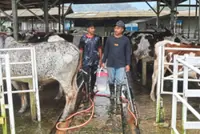WHEN Wendy Kan’s sister-in-law delivered her triplets in April, they were only 27 weeks in gestation and the babies weighed about 600g to 700g each. They were placed in incubators in the hospital’s Neonatal Intensive Care Unit. Their 28-year-old mother struggled to express her breast milk. Four days after the triplets’ arrival, she managed to squeeze out a few ounces of milk, barely enough to sustain the three babies. Prone to infection, premature babies will benefit from breast milk’s immunological properties, doctors told the family.
Kan sent out an SOS for donor milk on Facebook groups like Human Milk 4 Human Babies-Malaysia (HM4HB) and The Breastfeeding Advocates Network. Within hours, she was fielding calls from mothers with surplus milk from Malacca, Johor, Selangor and Kuala Lumpur.
“We were overwhelmed by their generosity and kindness,” says Kan of Malacca, over a phone interview. “We collected hundreds of bottles and packs of frozen milk from 10 mothers.
And everybody refused to take payment.” Some even offered their lactation consultants’ help to assist Kan’s sister-in-law to keep her milk supply flowing. Kan had to turn down many other offers.
Milk-swapping network
For eons, women have been nursing other women’s babies. Wet nurses – a friend, relative or stranger – filled in for mothers who couldn’t breastfeed or chose not to. Prophet Muhammad had wet nurses and so did Egypt’s King Tut and Napoleon. The practice of having these nannies was also common in old China, where they were known literally as nai ma (milk-mothers). By early in the 20th century, with the onslaught of infant formula in the market, increased awareness of disease transmission via breast milk and the difficulty in finding wet nurses, the age-old practice took a backseat.
The modern-day mother expresses her breast milk manually or uses a pump, and stores the milk in the fridge for later use or emergencies. Frozen breast milk keeps well up to three months in a home freezer or six to 12 months in a deep freezer.
And thanks to the Internet, women are now forming “milk-sharing” communities where they post a message if they have a surplus or need to supplement their baby’s milk feeds.
Montreal (Canada)-based Emma Kwasnica launched a global milk-sharing network online in October last year. Known as Human Milk 4 Human Babies (HM4HB), the network has 130 chapters spanning over 50 countries. The Facebook groups provide a space where families in need can connect with women who have milk to share. As Kwasnica’s philosophy states, “breast milk is not some sort of scarce commodity; it is a free-flowing resource,” the network doesn’t endorse buying or selling of breast milk.
In Malaysia, Kuala Lumpur-based Nadine Ghows took the initiative to start the Malaysian chapter in November last year. “We are essentially a network that facilitates mother-to-mother connections for the purpose of providing human milk for human children,” explains Ghows, a breastfeeding and gentle birth advocate.
As a Muslim, Ghows was also concerned about how the group should handle milk-sharing from an Islamic perspective. She contacted the folks behind HM4HB-Indonesia to get their feedback. (See sidebar “The Islamic angle”.)
“Their response was encouraging and their enthusiasm contagious,” says the mother of two girls. “I thought it’d be great to have some awareness of milk-sharing amongst Muslims and Malaysians in general so I roped in a few friends to help co-administer the Facebook page.”
From the initial 20-plus fans or “likes” the Malaysian chapter now boasts 452 “likes” through word-of-mouth. Readers have to “like” the page before they can post on the wall.
“Milk-sharing is based on the idea of informed choice. It’s up to the participants to do their own research but the group offers tips on the type of screening questions to ask donors and how to flash-pasteurise breast milk to kill bacteria, for example,” adds Ghows, who is training to be a childbirth educator. “I would want to get to know the mother or baby before I accept the donor milk.”





